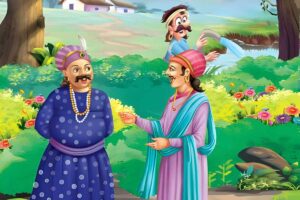Vikram and Betaal story- Betaal began his story once more when Vikramaditya brought him down from the tree and began his journey. His determination to take Betaal to the tantric was growing each time he climbed the Peepal tree.

Betaal was waiting for the king to give up but that was not going to happen for a very long time. The next story Betaal told Vikramaditya about a farmer’s boy who grew to be a great poet. Shricharan was born to a poor farmer in a village called Rampur. No matter how much his father tried to make him learn the art of growing grains in his fields, Shricharan’s interests clung to philosophy and poetry.
The local schoolmaster was impressed by Shricharan and he took up the responsibility responsibility to educate the boy. Shricharan was very intelligent. He mastered in three years what students usually took ten years to learn. This impressed his master.
He suggested that such a brilliant student must go to the city for further studies. However because Shricharan’s father could not afford to send his son to the city for further studies, Shricharan remained in the village and continued to write poems and songs.
One day a very famous poet was passing by the village. The schoolmaster taking advantage of the opportunity introduced his favourite student to the poet.
Shricharan’s poems were praised and the poet suggested that since Shricharan was extraordinarily talented he should go to the great scholar Pandit Mahananda and learn the art of poetry. There was a huge chance that the Pandit might introduce him to the king’s court.
Shricharan was excited to know this. He found out that a very rich landlord in his village called Kishanchand was a distant relative of Pandit Mahananda. He went to Kishanchand to request him for a letter of introduction. Kishan Chand was a kind man and he had known about Shricharan’s talent. However, he said, “I am sorry dear boy, Pandit Mahananda is a man of principles.
If you went to him with a recommendation, he would turn you away without even looking at your face. Therefore, I would suggest, instead of my letter, take with you some of your best work and try to impress him. If he likes them, he will surely take you as his student.”
Shricharan understood that impressing Pandit Mahananda was no piece of cake. He went back home and sat down to compose something that would charm the scholar. After tirelessly working for a month he was finally able to write a poem on Lord Krishna. He called it Shreekrishna Leelamrita.
Then on an auspicious day, he set off towards where Pandit Mahananda lived. When he reached the scholar’s house, he saw the scholar sitting on the steps of his house with a piece of paper. A student sat at his feet listening intently. Shricharan decided to listen to their conversation.
Pandit Mahananda was criticizing the composition and he was being very cruel. He said that there were grammatical errors, the meter was wrong and the imagery did not make sense. The student looked
like he was about to cry. It seemed like he was an upcoming poet. Shricharan could not hold himself back any longer. He bowed to the great man and said, “Even if a lotus grows in the mud, we must admire its beauty first.”
What Shricharan meant was that a critic must first admire the poem for its beauty before criticizing it for its mistakes. Pandit Mahananda was furious. “How dare you interrupt me? Who do you think you are to talk to me like this? Do you think you know more than I do?” Shricharan politely told him that he had come to seek his guidance. He wished to be Pandit Mahananda’s student. The scholar was angry. He refused to fulfil Shricharan, ‘s wish.
Poor Shricharan was forced to return with a heavy heart. When he arrived at his village, he went straight to Kishanchand and handed him the manuscript of Shreekrishna Leelamritas. “I do not want it anymore.
The Pandit has turned me away,” he said sadly. Kishanchand tried his best to lift the boy’s spirits but it was in vain. After a few days, Kishan Chand received a letter from Pandit Mahananda asking about a boy who had come to him with a script called Shreekrishna Leelamritas.
When Kishanchand sent him Shricharan’s manuscript, Pandit Mahananda wrote to Shricharan, saying he would gladly accept Shricharan as his student. Shricharan was overjoyed. In the years that followed, he became a famous poet and was introduced to the king’s court by his guru.
Betaal asked Vikramaditya, “Why did Pandit Mahananda who was so arrogant at first, decide to take Shricharan as his disciple?”
The king said, “Pandit Mahananda was a great scholar. He knew that only by pointing out the mistakes in a student’s composition he would be able to improve the student. He was scolding the student that day for the student’s own good. Shricharan’s poem was beautiful and being a great scholar Pandit Mahananda could not overlook the boy’s talents.
He knew Shricharan deserved to be taught by him and later on to be recognized by the king himself.” Betaal admired King Vikramaditya’s wisdom. He told the king that his answer was right and flew back to the tree.







